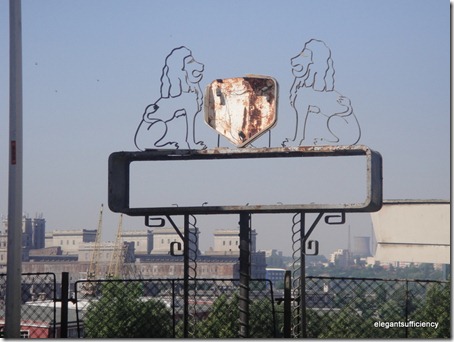Romania…ker-ching!

Another day, another good reason to get the passport out. This morning, we docked in Constantza, second city of Romania and fourth largest port in Europe. (see, we were listening!) We took the shuttle bus into town after breakfast and found ourselves in Ovid Square, named after the poet who was exiled here after writing an overly erotic poem – or so the story goes.

The square was not exactly well tended nor immediately bursting with possibilities. It’s Sunday and all was fairly quiet. We’d got off the bus right outside the Archaelogical Museum but the dusty relics in a covered veranda were not sufficient to tempt us inside

We wandered a little, finding a grassy square to the other side and looked more closely at the Roman memorials set in line along the pathway.

Dating from around 2 or 3 AD, there were translations of the inscriptions (just as well, for we don’t read Greek!) and these were not only interesting but rather moving.

Most ended with good wishes, this one reads “Live long, passer-by”.

As we wandered amongst these stones, we noticed that almost every woman who passed was carrying lilies. Some held one or two stems, others a whole bunch. What was going on? Suddenly finding a new focus for our morning in Constantza, we determined to find out.

The trail was quite easy to follow. Just around the corner were sellers of the flowers. Only lilies. We continued down the street, to find more.

But no-one tried to sell us the flowers and we followed a the trail a little further.

The answer lay in the church with the panel above the door, showing a saintly portrait including an image of a lily. Women (one or two men, but this was a mostly female activity) were taking their lilies into the church for blessing, then bringing them home again, to celebrate a particular festival. Quite what, we have no idea; when we can google more freely, we will try to find out!

We stood for a while, quietly observing the local custom and watching the people before going a little further towards the harbour and the old Casino, a relic of an earlier, more prosperous time.

As we walked along the Bdul Elisabeta, we passed a smarter, more prominent Orthodox church

Like a moth to a flame, I was drawn to look more closely at one of the doors along the side of the building

People were going in and out of the main door and I could hear music inside. Covering my head, I joined the women as they went through the heavy wool curtain and stood with them inside and absorbed the wonderful atmosphere of this ancient ritual.
Not a square inch of the interior was unadorned. Every wall was covered with painted icons, in deep blues and rich reds with gold highlights which shone in the candlelight. In the centre of the nave was an enormous gold incense burner and behind it, an iconostasis which I would have loved to have seen more closely.
The congregation stood, as is the way in an Orthodox church, shoulder to shoulder – there was not much room for newcomers and yet everyone shuffled a little to let us in. Somewhere at the front, the priests were conducting the ceremony, moving about to bless those who made their way to the front. All the time, there was the most moving chant with that deep bass undertone so representative of Orthodox music. I could have stood for hours, taking it all in.

But it was time to go, to return to the ship for a short break before this afternoon’s activity: A drive out into the countryside to Histria, a seventh century BC settlement. On the way there, we stopped at the Ethnographic Museum where there were some interesting artefacts including this icon painted on glass, a speciality of the Transylvania region.
More later!










